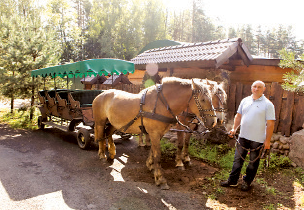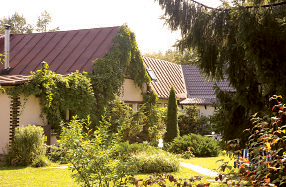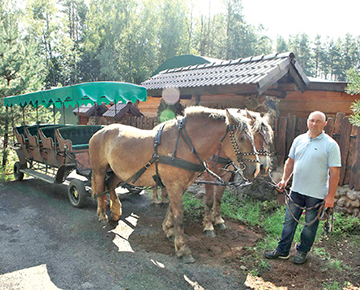Development of farm tourism will help Belarus breathe new life into unpromising villages
During his recent working trip to the Minsk Region, Alexander Lukashenko familiarised himself with the latest agro-eco-tourism development, using the agro-estates of the Volozhin District as an example.
 He notes, “A great many villages are labelled as unpromising and there are many isolated farmsteads. Why shouldn’t those who grew up there, or businessmen or anyone else, build agro-estates in such places? They would revive the countryside by doing so.” He believes that local residents could help by taking care of estates. “I encourage people towards this kind of business and some are already engaged in it accordingly.”
He notes, “A great many villages are labelled as unpromising and there are many isolated farmsteads. Why shouldn’t those who grew up there, or businessmen or anyone else, build agro-estates in such places? They would revive the countryside by doing so.” He believes that local residents could help by taking care of estates. “I encourage people towards this kind of business and some are already engaged in it accordingly.”The President is confident that owners of such agro-estates would gradually develop their estates and set up farming enterprises. “They may breed ponies or keep a dozen cows. It will happen and I’d like to revive our villages this way. We built agro-towns, which was a good thing to do, and they may evolve into future towns. However, we are yet to revive these villages and isolated farmsteads.”
According to the Head of State, some businessmen are already supporting this proposal, investing in the places where they were born.
Mr. Lukashenko points out that, as a transit state, Belarus should place more emphasis on developing roadside services, choosing populated localities close to motorways, since this will help revive smaller settlements. He explains, “We don’t have to build motorway services from the ground up, because there are district centres every 35-50km — along all roads. Let’s connect recreation outlets, services and refuelling stations to the infrastructure of such settlements; 35km is no distance at all. We don’t need more, or they won’t receive enough work. This will revive district centres and bring development along motorways.”
 A Presidential Decree was adopted in Belarus in 2006 encouraging conditions for the development of agro-eco-tourism; it allows rural Belarusians to earn income and contributes to the creation of new jobs and rural revival. Agro-eco-tourism isn’t considered entrepreneurial, so rural tourism operators are exempt from taxation, rather paying an annual fee of just one ‘base amount’. Over the last six years, the number of agro-estates in Belarus has increased 10-fold: from 188 to 1,881. With the assistance of municipal authorities, 22 agro-tourism clusters have been established in Belarus, linking owners of agro-estates with public catering enterprises, farming enterprises and other service providers.
A Presidential Decree was adopted in Belarus in 2006 encouraging conditions for the development of agro-eco-tourism; it allows rural Belarusians to earn income and contributes to the creation of new jobs and rural revival. Agro-eco-tourism isn’t considered entrepreneurial, so rural tourism operators are exempt from taxation, rather paying an annual fee of just one ‘base amount’. Over the last six years, the number of agro-estates in Belarus has increased 10-fold: from 188 to 1,881. With the assistance of municipal authorities, 22 agro-tourism clusters have been established in Belarus, linking owners of agro-estates with public catering enterprises, farming enterprises and other service providers.The President visited a successful example of an agro-tourism cluster: Valozhynskiya Gastintsy, which combines Mikhalovo and Koni-Poni agro-estates. Tourists can enjoy a ‘green route’ through the agro-estates of the Volozhin District, visiting folk museums, or take a bicycle tour of up to 150km.
“The most important thing is the emergence of a class of property owners. They have not taken their property from someone else, having earned their ownership through honest labour. It’s all to the good and the more people like that, the stronger our country’s independence.”
Mr. Lukashenko toured the agro-estates and gained familiarity with their recreational facilities. Estate owners thanked him for the favourable conditions created for agro-eco-tourism but the President responded, “I should be the one to thank you for saving Belarus. If we fail in this, the country will be no more.” The President believes that demand for this kind of recreation should rise year on year and asserts, “Everyone wants some peace, being tired of noise and vanity, and Belarus is just the place.”











